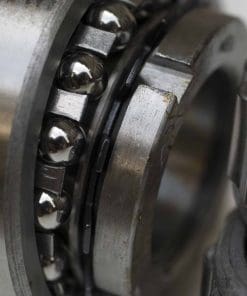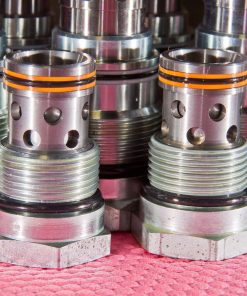No products in the cart.
Krytox™ Lubricant Articles
Krytox™ Valve Lubricants
Smooth Operation in Extreme Temperatures and Longer Use-Life Make Krytox™ Valve Lubricants the Choice for Valve Seals
Control valves are critical components in plant operations around the world. To optimize operational integrity, valves require proper maintenance. Long-lasting Krytox synthetic lubricants keep valves operating smoothly with less maintenance. Krytox oils and greases can also provide long-term corrosion resistance and enhanced performance, even in harsh environments, as well as extending the wear life of valve seals.
High lubricity, perfluoropolyether- (PFPE-) based Krytox performance lubricants are chemically compatible with all seal materials typically used in industrial applications. The remarkable characteristics of Krytox performance lubricants include:
- Compatible with most chemicals used in industrial applications
- Nontoxic, non-flammable
- Undamaged by—and non-reactive with—acidic or caustic cleaners and disinfectants, steam, moisture, and high temperatures
- Minimal environmental footprint—chemically and biologically inert, and silicone-free
- Contain no volatile organic compound (VOC) materials or chlorine
Krytox lubricants provide smooth valve operation, less re-lubrication, and field-proven performance that can save you time and money. And, they are ideal for demanding conditions—high and low temperatures, extreme pressure, and harsh environments.
Examples of Valve Lubricants and Valve-Related Applications
- An American electricity generating company avoided costly shutdowns due to dried-out grease in its steam turbine governor control valves when they converted to Krytox XHT-BDZ grease; the switch also improved the reliability of supply to the electric grid and enhanced the bottom line.
- A Korean valve manufacturer was able to reduce damage claims to its pilot-type solenoid valves by applying Krytox GPL 103 oil grade to the solenoid coil in the assembly to reduce friction and heat, and coating the spools and seals with Krytox GPL 223 grease grade to resist degradation from water and oil.
- A South American manufacturer of big-bore engines used Krytox XP 2C5 grease grade to lubricate its EGR valves. The special additives in Krytox XP 2C5 prevent corrosion and allow free movement of the
metal-to-metal mechanism; the grease is inert to nitrous oxide gas and withstands temperatures up to 160 ºC (320 ºF). - A French airport authority using Krytox XP 2A3 and XP 2A5 grease grades was able to achieve annual savings of €15,000 to 20,000 on the maintenance of its jet fuel pipeline by reducing scheduled maintenance to every 30 months instead of every four to six months—and unscheduled shutdowns due to valve failures were eliminated.
- A German manufacturer of gear-operated exhaust gas recirculation (EGR) valves for the automotive industry reduced failures due to excessive separation of grease and oil that were occurring at low temperatures and heavy vibrations. Switching to Krytox GPL 216 grease grade, the manufacturer was able to improve the reliability of its EGR valves and estimates that it is saving €80,000 ($100,000+) annually.
- For a steam control valve application at an Icelandic power plant, standard hydrocarbon-based grease proved unsatisfactory for lubricating bushings for valves that control the flow of high-temperature steam
containing corrosive geothermal gases. The optimum lubricant would need to withstand the acidic gases and have low friction for accurate control of the valve position, as well as be capable of performing in a selfgreasing system. Krytox GPL 206 grease met the challenge for lubrication of the steam valve bushing, providing the low static friction and no stick-slip that is required for accurate position control.
To learn more about Valve Lubricants and Krytox please click here.
Notwithstanding any express or implied indication to the contrary, product information provided on or via this website is supplied upon the condition that the persons receiving such information will make their own, independent determination as to a given product’s suitability for any contemplated purposes prior to use. In no event will Miller-Stephenson be responsible for damages of any nature whatsoever resulting from the use of, or reliance upon, information provided, directly or indirectly, on this website in relation to any product and/or application.




